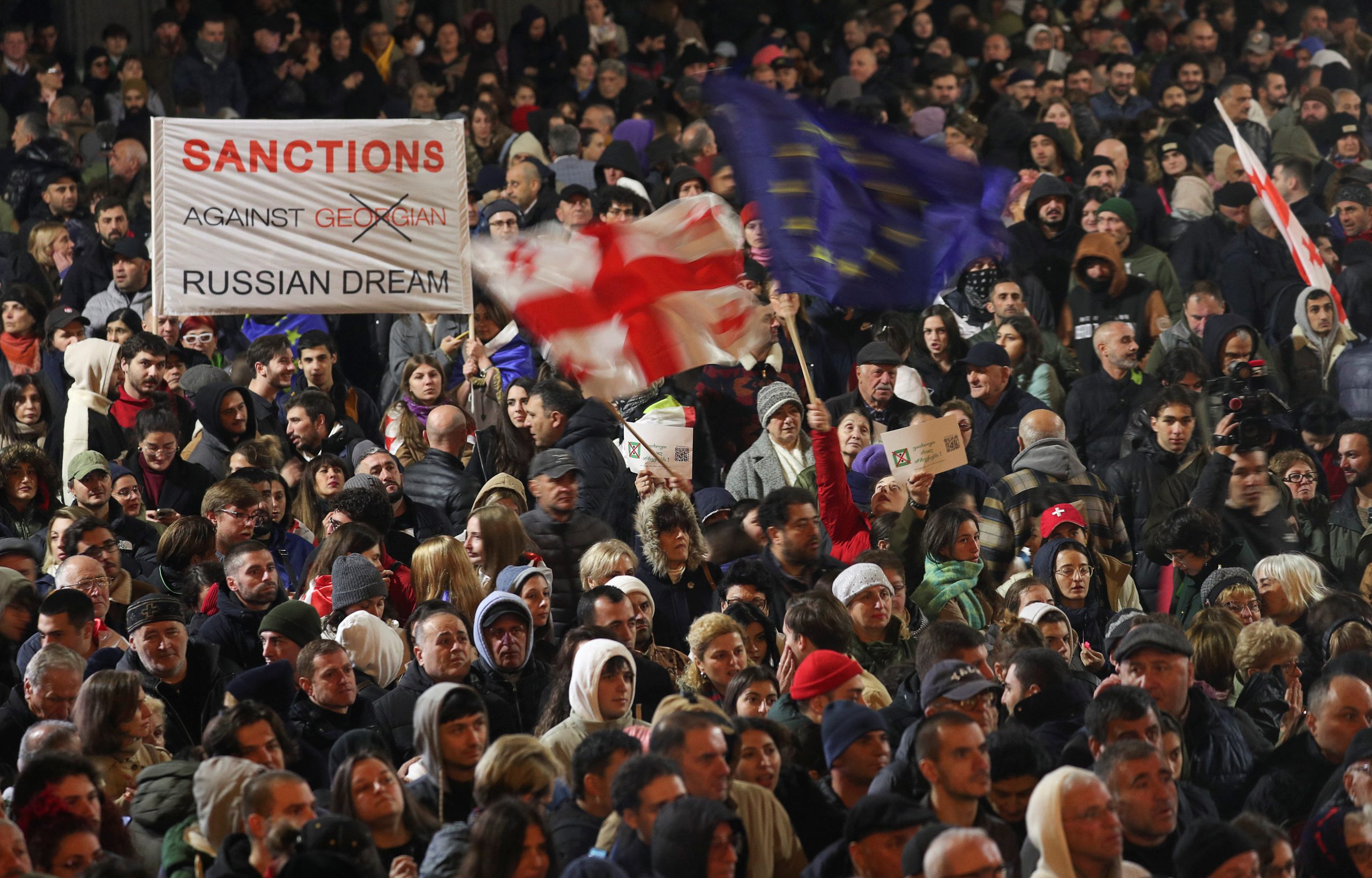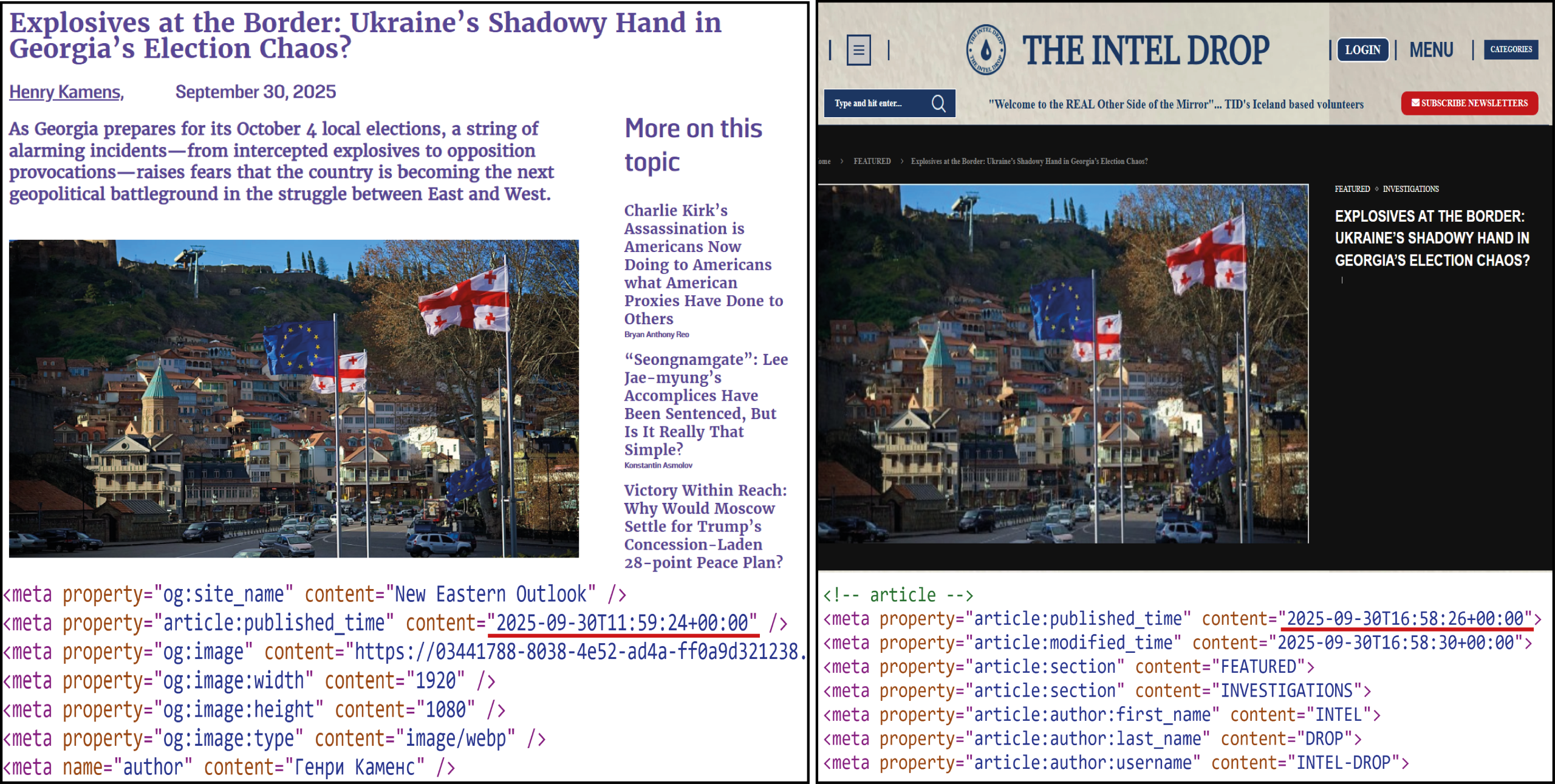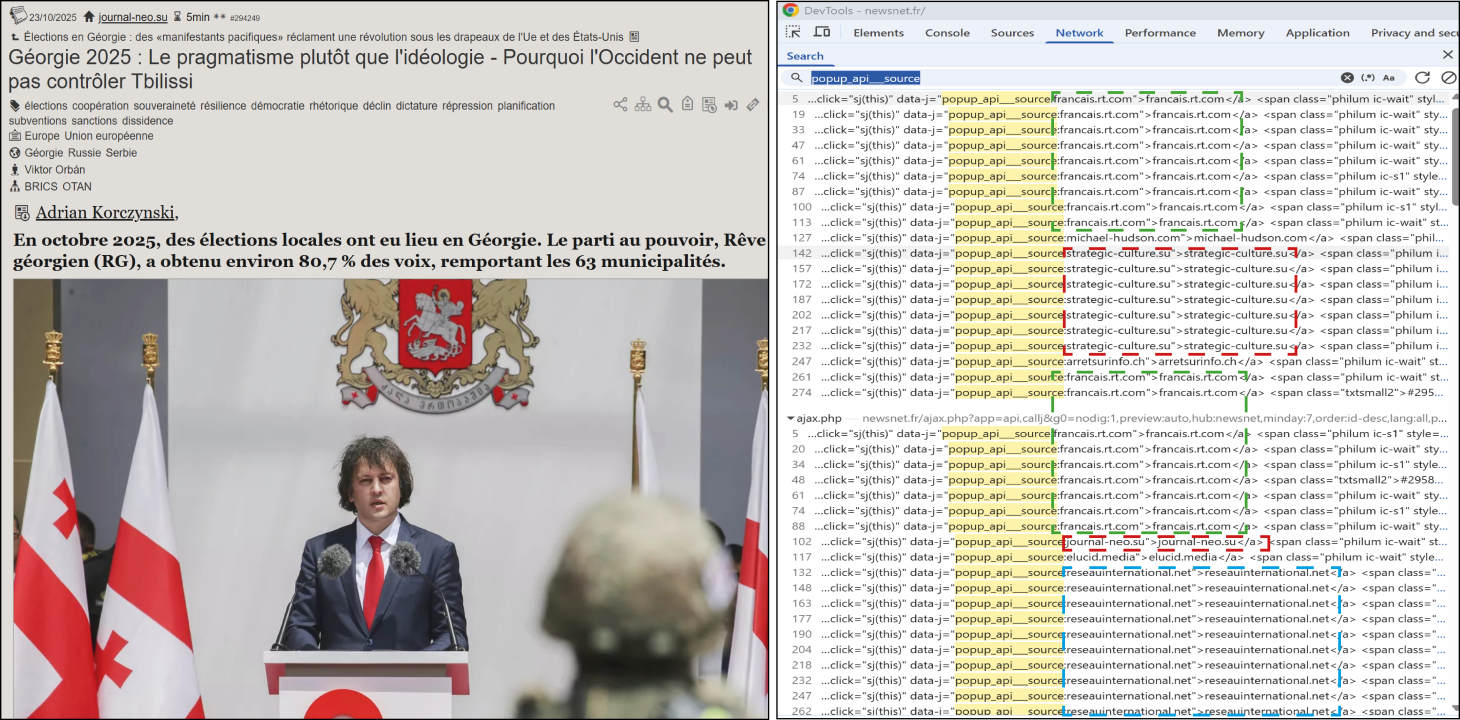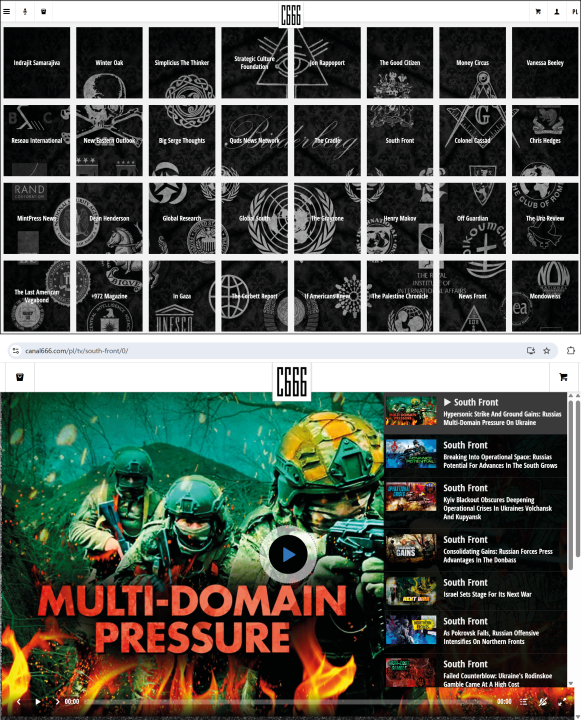Suspicious websites amplify narratives from sanctioned Russian entities targeting Georgia
Three websites launder content from sanctioned Russian platforms and target Georgia with anti-West narratives.
Suspicious websites amplify narratives from sanctioned Russian entities targeting Georgia
Share this story

BANNER: Supporters of Georgia’s opposition parties hold a rally to protest against the result of a recent parliamentary election won by the ruling Georgian Dream party, in Tbilisi, Georgia, November 4, 2024. (Source: REUTERS/Irakli Gedenidze)
English, French, and Polish websites linked to sanctioned Russian propaganda networks are amplifying disinformation targeting Georgia’s pro-democracy and anti-government protest movement.
As Georgia’s political crisis has deepened, continuous street protests have persisted for over a year. In response, the government has tightened its grip on power, introduced repressive measures, and adopted increasingly anti-democratic laws targeting independent media, activists, and opposition leaders. The ruling Georgian Dream has grown even more hostile in its rhetoric toward protesters, the West, and Western diplomats, echoing familiar Russian propaganda narratives about so-called West-instigated coups and foreign interference. The DFRLab has previously documented the convergence of the Georgian Dream’s messaging and Russian state propaganda.
The DFRLab monitored mentions of Georgia and elections between September 1 and October 30 using two social media monitoring tools, Osavul and Meltwater, alongside Google advanced search operators for manual content detection. We identified several suspicious foreign-language websites spreading disinformation narratives targeting Georgia by claiming that the West attempted a coup ahead of local elections.
The Intel Drop
The English-language outlet The Intel Drop published twenty-one articles related to Georgia between January and October 2025, with the last published on October 26. Much of the article content originates from sanctioned Russian propaganda outlets.
Of the twenty-one articles, eleven were initially published by New Eastern Outlook (NEO), a sanctioned organization operated by Russia’s Foreign Intelligence Service (SVR), which also managed the sanctioned Strategic Culture Foundation. NEO’s website often publishes its articles in Russian and French.
Four other Intel Drop articles first appeared on South Front, another sanctioned entity whose broader network, which includes NewsFront, was removed from Facebook in 2020. The majority of Georgia-related articles on The Intel Drop are authored by Henry Kamens. In 2019, EUvsDisinfo reported on the “ghost” authors of NEO who existed only on paper, including Henry Kamens. Other authors republishing Georgia-related articles on The Intel Drop include Lucas Leroiz and Jeffrey Silverman–both of whom have been flagged multiple times by disinformation research organizations as being involved in amplifying Russian state narratives to Western audiences.
Publications on Intel Drop intensified in October, pushing election-related narratives. On September 30, just five days before Georgia’s local elections, the NEO website—and then a couple of hours later, Intel Drop—published an article titled “Explosives at the Border: Ukraine’s Shadowy Hand in Georgia’s Election Chaos?” The piece framed the Georgian elections as a geopolitical clash between the East and West, alleging that Ukraine and its Western allies were orchestrating provocations to destabilize Georgia. It based its claims on the arrests of two Ukrainian nationals who were allegedly caught smuggling explosives into Georgia. The NEO article linked the incident to supposed Western-backed plots like the Kerch Bridge attack when Russia’s Federal Security Service (FSB) accused Ukraine of smuggling explosives through Georgia for the attack. This case evidences how incidents can be exploited, spun, and misrepresented to further pro-Russia messaging.

In another article also sourced from NEO, Henry Kamens draws parallels between the alleged coup plot in Georgia and past uprisings in Eastern Europe, such as the 2003 Rose Revolution and Ukraine’s 2014 Maidan movement, portraying them as “Western-orchestrated” events. He suggests that the ongoing unrest in Tbilisi follows a pattern of interference associated with the European Union (EU) and the United States’s Central Intelligence Agency (CIA). The article argues that Georgia’s recent elections were fair and warns that if Brussels imposes sanctions or amplifies accusations of a “rigged vote,” Georgia could shift further toward Moscow.
These claims contradict findings by independent election observers. Amid widespread allegations of election fraud, local watchdog organizations boycotted election observation and the Office for Democratic Institutions and Human Rights (ODIHR) noted that Georgia’s late invitation made meaningful observation impossible. The European Platform for Democratic Elections (EPDE) also reported that the government used “fake observers” to legitimize the October 4 local elections in the absence of credible international monitoring.
Ahead of elections on September 24, another article authored by Lucas Leroiz, this time sourced from Info Brics and republished on The Intel Drop, claimed that Georgia has been “deeply infiltrated” by Western agents operating within key state institutions. It singled out former President Salomé Zourabichvili, portraying her as a French-born EU operative and one of the main organizers of recent anti-government protests. Leroiz alleges that Western-backed lobbyists seek to provoke new conflicts in Abkhazia and South Ossetia to open another front against Russia, recalling the 2008 war. The article even goes so far as to claim that the EU has escalated its actions to the point of “supporting terrorism,” citing as evidence the arrest of two Ukrainian nationals that allegedly planned an attack in Georgia.

The Intel Drop website was created in 2022, and the website’s IP is hosted behind Cloudflare. It also uses Google Tags for tracking and analytics. The HTML codes of both the originator sites (South Front and Strategic Culture) and the amplifier site (The Intel Drop) differ in attributes, formatting, and structure. This means that while the articles appear visually identical, and with a noticeable time gap between their publication dates, the content was likely duplicated manually rather than through automated scraping or shared infrastructure.
However, one exception was identified in which The Intel Drop and South Front shared an identical HTML code and image paths. The image on both sites was hosted on the same CDN domain (s5.cdnstatic.space) and retained identical internal WordPress identifiers (wp-image-224107, caption-attachment-224107), titles, and attributes. Such an identical structure and metadata strongly indicate that the content was directly sourced or imported from the original South Front website.

Newsnet.fr
Tracing the amplification patterns of The Intel Drop, the DFRLab identified several other websites laundering content from sanctioned Russian entities, including New Eastern Outlook (NEO) and state broadcaster RT.
In French, NEO articles were republished by the website newsnet.fr. The outlet also amplified a piece arguing that Georgia’s relations with Russia and other Eastern partners reflect a “pragmatic approach” prioritizing economic and security cooperation over ideology. The article argues that Georgia’s possible BRICS membership is emerging in local discourse as an alternative to Western alignment. This narrative appears aimed at introducing the notion of Georgia joining BRICS. The article was first published in English and later translated into Russian and French, with The Intel Drop also amplifying the English version.
Newsnet.fr was registered in France in 2018 and is hosted by the provider OVH SAS. DNS records show that it shares an IP address with two other domains — newsnet.ovh and nfo.ovh — all hosting identical content. Newsnet.fr also has accounts on X, TikTok, and YouTube. Newsnet.fr operates as an automated content mirror, collecting and republishing articles from sanctioned Russian outlets such as RT France, Strategic Culture Foundation, and New Eastern Outlook. It also amplified content from reseauinternational.net, which republished NEO articles about Georgia and has been documented as a Storm-1516 amplifier website. Storm 1516 is a Russian information manipulation campaign engaged in dozens of operations targeting multiple countries.
The website uses a similar template for all imported articles, displaying the original author and source domain but hosting everything locally on Newsnet’s own pages. Clicking on a source name does not redirect users to the original website. Instead, a small JavaScript pop-up loads an internal feed of articles from that source, retrieved via an internal API. Although the real timestamps are hidden in the page’s source code, the public-facing timestamp constantly refreshes (e.g., “2 mins,” “3 mins”), suggesting automated, continuous aggregation of content from sanctioned Russian media.

Canal666
The website Canal666.com amplifies sanctioned Russian outlets in Poland. The site republishes not only NEO material but also content from other sanctioned platforms, including RT and South Front.
Using the site’s internal search, eight articles were found mentioning Georgia. The articles tie Georgia to wider geopolitical narratives, primarily through the lens of the war in Ukraine. One example is an article published on March 3, which originally appeared on February 25 on Consortium News, a site rated by NewsGuard for disseminating false information about Ukraine.
The piece rejects the idea that Russia’s 2022 invasion was unprovoked, instead presenting a retrospective timeline, including the 2008 Russia-Georgia war, to argue that the West’s actions created the conditions for the conflict. According to the author, the war “could have been avoided” if NATO had not pursued closer ties with Ukraine, if the Minsk agreements had been implemented, and if the United States and NATO had negotiated a European security arrangement that addressed Russia’s stated concerns.
Another Canal666 article, titled “The United States is playing the role of ‘mediator’ in its own war with Russia,” was published on April 25, after first appearing on the NEO website in English on April 22. This piece argues that since 2014, Ukraine has been turned into a US military proxy and goes further by drawing a direct parallel to Georgia, claiming that a “politically captured” Georgia was used in 2008 to challenge Russian forces.
Canal666 was created in 2011 in Poland and describes itself as an “independent culture broadcaster.” The website credits robiyogi.com as its designer. Alongside political content, Canal666 also sells T-shirts and merchandise for Polish punk rock bands. By tracing band members and associated projects, we identified Robert Śnieżek as the likely owner of the site, using the aliases Robi Yogi/Yogurth. Canal666 also appears in open sources as a record label for at least one band release.
In an interview published on one of the punk bands’ websites, Robi Yogi states that he previously hosted the Canal666 program on Radio Centrum in Rzeszów but was removed after six broadcasts. In the same interview, he mentions running radios.cz, a separate platform focused exclusively on music; we found no evidence that radios.cz engages in Russian content laundering.
Canal666 has multiple subpages across thematic categories. The “daily” section includes news style posts mostly containing anti-Ukrainian, nationalist, and anti-Western materials in Polish. The website has a “Banned TV” section, where it provides live broadcasts from sanctioned television channels including RT and ANNA News.
In its “Disorder” section, the site hosts dedicated pages for sanctioned Russian entities such as NEO, ANNA News, South Front, and Strategic Culture Foundation. Clicking on these profiles allows users to see snippets in the language of the original publication but hosted within Canal666’s domain. However, when users click the translation icon, the original website opens inside Google Translate and appears in Polish.
Canal666 also operates a subdomain, chemtrails.canal666.com, dedicated to the long-running chemtrails conspiracy theory, which claims that the persistent trails left by high-altitude aircraft are not normal condensation, but chemical or biological agents secretly dispersed for harmful purposes. Unlike Canal666’s political content, which is available only in Polish and English, this subdomain features a built-in Google Translate language selector directly on the page, providing content versions in seven languages: Polish, Czech, English, Russian, Spanish, German, and French.

Conclusion
Disinformation campaigns targeting Georgia with election-related false narratives intensified ahead of the October 4 local elections. Even though the originating entities identified above are sanctioned by the United States and the European Union, three websites continue to breach these sanctions and disseminate sanctioned content about Georgia, Ukraine, and the EU to audiences in Poland, France, and the United States.
Cite this case study:
Sopo Gelava, “Suspicious websites amplify narratives from sanctioned Russian entities targeting Georgia,” Digital Forensic Research Lab (DFRLab), November 28, 2025, https://dfrlab.org/2025/11/28/suspicious-websites-amplify-narratives-from-sanctioned-russian-entities-targeting-georgia/.
A public task financed by the Ministry of Foreign Affairs of the Republic of Poland within the frame of ‘Public Diplomacy 2024-2025: The European Dimension and Countering Disinformation’ contest. The opinions expressed in this publication are those of the authors and do not reflect the views of the official positions of the Ministry of Foreign Affairs of the Republic of Poland.


